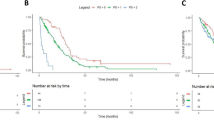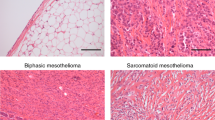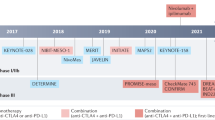Abstract
Malignant pleural mesothelioma is an aggressive thoracic malignancy associated with exposure to asbestos, and its incidence is anticipated to increase during the first half of this century. Chemotherapy is the mainstay of treatment, yet sufficiently robust evidence to substantiate the current standard of care has emerged only in the past 5 years. This Review summarizes the evidence supporting the clinical activity of chemotherapy, discusses the use of end points for its assessment and examines the influence of clinical and biochemical prognostic factors on the natural history of malignant pleural mesothelioma. Early-phase clinical trials of second-line and novel agents are emerging from an increased understanding of mesothelioma cell biology. Coupled with high-quality translational research, such developments have real potential to improve the outlook of patients at a time of increasing incidence.
Key Points
-
Malignant pleural mesothelioma remains a highly lethal cancer, which is increasing in incidence in several countries
-
Chemotherapy is the mainstay of treatment for the majority of patients presenting as inoperable
-
Despite the therapeutic plateau of the past 20 years, randomized trials have now confirmed that combining antifolates with platinum-based therapy confers a survival benefit
-
No standard therapy has yet been defined in the second-line setting
-
New approaches for treating this disease are arising from a better understanding of the underlying biology and are beginning to be translated into the clinical setting
This is a preview of subscription content, access via your institution
Access options
Subscribe to this journal
Receive 12 print issues and online access
$209.00 per year
only $17.42 per issue
Buy this article
- Purchase on Springer Link
- Instant access to full article PDF
Prices may be subject to local taxes which are calculated during checkout



Similar content being viewed by others
References
Hodgson JT et al. (2005) The expected burden of mesothelioma mortality in Great Britain from 2002 to 2050. Br J Cancer 92: 587–593
Flores RM (2005) The role of PET in the surgical management of malignant pleural mesothelioma. Lung Cancer 49 (Suppl 1): S27–S32
Berghmans T et al. (2002) Activity of chemotherapy and immunotherapy on malignant mesothelioma: a systematic review of the literature with meta-analysis. Lung Cancer 38: 111–121
Ellis P et al. (2006) The use of chemotherapy in patients with advanced malignant pleural mesothelioma: a systematic review and practice guideline. J Thorac Oncol 1: 591–601
van Meerbeeck JP et al. (2005) Randomized phase III study of cisplatin with or without raltitrexed in patients with malignant pleural mesothelioma: an intergroup study of the European Organisation for Research and Treatment of Cancer Lung Cancer Group and the National Cancer Institute of Canada. J Clin Oncol 23: 6881–6889
Vogelzang NJ et al. (2003) Phase III study of pemetrexed in combination with cisplatin versus cisplatin alone in patients with malignant pleural mesothelioma. J Clin Oncol 21: 2636–2644
Fennell DA and Rudd RM (2004) Defective core-apoptosis signalling in diffuse malignant pleural mesothelioma: opportunities for effective drug development. Lancet Oncol 5: 354–362
Byrne MJ and Nowak AK (2004) Modified RECIST criteria for assessment of response in malignant pleural mesothelioma. Ann Oncol 15: 257–260
Oxnard GR et al. (2006) Modeling of mesothelioma growth demonstrates weaknesses of current response criteria. Lung Cancer 52: 141–148
Francart J et al. (2006) Progression-free survival rate as primary end point for phase II cancer clinical trials: application to mesothelioma. The EORTC Lung Cancer Group. J Clin Oncol 24: 3007–3012
O'Brien ME et al. (2006) A randomised trial in malignant mesothelioma (M) of early (E) versus delayed (D) chemotherapy in symptomatically stable patients: the MED trial. Ann Oncol 17: 270–275
Muers MF et al. (2004) BTS randomised feasibility study of active symptom control with or without chemotherapy in malignant pleural mesothelioma: ISRCTN 54469112. Thorax 59: 144–148
Andreopoulou E et al. (2004) The palliative benefits of MVP (mitomycin C, vinblastine and cisplatin) chemotherapy in patients with malignant mesothelioma. Ann Oncol 15: 1406–1412
Steele JP et al. (2000) Phase II study of vinorelbine in patients with malignant pleural mesothelioma. J Clin Oncol 18: 3912–3917
Green J et al. Pemetrexed disodium in combination with cisplatin versus other cytotoxic agents or supportive care for the treatment of malignant pleural mesothelioma. Cochrane Database Systematic Reviews 2007, Issue 1. Art No.:CD005574. doi:10.1002/14651858.CD005574.pub2.
Bottomley A et al. (2006) Short-term treatment-related symptoms and quality of life: results from an international randomized phase III study of cisplatin with or without raltitrexed in patients with malignant pleural mesothelioma: an EORTC Lung-Cancer Group and National Cancer Institute, Canada, Intergroup Study. J Clin Oncol 24: 1435–1442
Weder W et al. (2004) Neoadjuvant chemotherapy followed by extrapleural pneumonectomy in malignant pleural mesothelioma. J Clin Oncol 22: 3451–3457
Sugarbaker DJ et al. (1999) Resection margins, extrapleural nodal status, and cell type determine postoperative long-term survival in trimodality therapy of malignant pleural mesothelioma: results in 183 patients. J Thorac Cardiovasc Surg 117: 54–63
MARS (mesothelioma and radical surgery) trial. http://pfsearch.ukcrn.org.uk/StudyDetail.aspx?TopicID=1&StudyID=1189
Zucali PA and Giaccone G (2006) Biology and management of malignant pleural mesothelioma. Eur J Cancer 42: 2706–2714
Fennell DA et al. (2007) Efficacy and safety of first- or second-line irinotecan, cisplatin, and mitomycin in mesothelioma. Cancer 109: 93–99
Nagel S et al. (2005) Second-line treatment of malignant pleural mesothelioma with Pemetrexed (Alimta)—a case report. Pneumologie 59: 108–111
Giaccone G et al. (2002) Phase II trial of ZD0473 as second-line therapy in mesothelioma. Eur J Cancer 38 (Suppl 8): S19–S24
Manegold C et al. (2005) Second-line (post-study) chemotherapy received by patients treated in the phase III trial of pemetrexed plus cisplatin versus cisplatin alone in malignant pleural mesothelioma. Ann Oncol 16: 923–927
Sorensen JB et al. (2007) Pemetrexed as second-line treatment in malignant pleural mesothelioma after platinum-based first-line treatment. J Thorac Oncol 2: 147–152
Jassem J et al. (2006) A randomized phase III trial comparing pemetrexed plus best supportive care (BSC) versus BSC in previously treated patients with advanced malignant pleural mesothelioma. Ann Oncol 17: ix214
Spirtas R et al. (1988) Survival patterns for malignant mesothelioma: the SEER experience. Int J Cancer 41: 525–530
Herndon JE et al. (1998) Factors predictive of survival among 337 patients with mesothelioma treated between 1984 and 1994 by the Cancer and Leukemia Group B. Chest 113: 723–731
Curran D et al. (1998) Prognostic factors in patients with pleural mesothelioma: the European Organization for Research and Treatment of Cancer experience. J Clin Oncol 16: 145–152
Fennell DA et al. (2005) Statistical validation of the EORTC prognostic model for malignant pleural mesothelioma based on three consecutive phase II trials. J Clin Oncol 23: 184–189
Edwards JG et al. (2000) Prognostic factors for malignant mesothelioma in 142 patients: validation of CALGB and EORTC prognostic scoring systems. Thorax 55: 731–735
Flores RM et al. (2006) Positron emission tomography predicts survival in malignant pleural mesothelioma. J Thorac Cardiovasc Surg 132: 763–768
Ceresoli GL et al. (2006) Early response evaluation in malignant pleural mesothelioma by positron emission tomography with [18F]fluorodeoxyglucose. J Clin Oncol 24: 4587–4593
Lopez-Rios F et al. (2006) Global gene expression profiling of pleural mesotheliomas: overexpression of aurora kinases and P16/CDKN2A deletion as prognostic factors and critical evaluation of microarray-based prognostic prediction. Cancer Res 66: 2970–2979
Ohta Y et al. (1999) Tumor angiogenesis and recurrence in stage I non-small cell lung cancer. Ann Thorac Surg 68: 1034–1038
Edwards JG et al. (2001) Angiogenesis is an independent prognostic factor in malignant mesothelioma. Br J Cancer 85: 863–868
Strizzi L et al. (2001) Vascular endothelial growth factor is an autocrine growth factor in human malignant mesothelioma. J Pathol 193: 468–475
Ohta Y et al. (1999) VEGF and VEGF type C play an important role in angiogenesis and lymphangiogenesis in human malignant mesothelioma tumours. Br J Cancer 81: 54–61
Kumar-Singh S et al. (1999) Angiogenic cytokines in mesothelioma: a study of VEGF, FGF-1 and -2, and TGF beta expression. J Pathol 189: 72–78
Klabatsa A et al. (2006) Expression and prognostic significance of hypoxia-inducible factor 1alpha (HIF-1alpha) in malignant pleural mesothelioma (MPM). Lung Cancer 51: 53–59
Erler JT et al. (2004) Hypoxia-mediated down-regulation of Bid and Bax in tumors occurs via hypoxia-inducible factor 1-dependent and -independent mechanisms and contributes to drug resistance. Mol Cell Biol 24: 2875–2889
Kokturk N et al. (2005) Prognostic significance of Bax and Fas ligand in erionite and asbestos induced Turkish malignant pleural mesothelioma. Lung Cancer 50: 189–198
Soini Y et al. (1999) Apoptosis and expression of apoptosis regulating proteins bcl-2, mcl-1, bcl-X, and bax in malignant mesothelioma. Clin Cancer Res 5: 3508–3515
O'Kane SL et al. (2006) Expression of bcl-2 family members in malignant pleural mesothelioma. Acta Oncol 45: 449–453
Segers K et al. (1994) Immunoreactivity for bcl-2 protein in malignant mesothelioma and non-neoplastic mesothelium. Virchows Arch 424: 631–634
Narasimhan SR et al. (1998) Resistance of pleural mesothelioma cell lines to apoptosis: relation to expression of Bcl-2 and Bax. Am J Physiol 275: L165–L171
Gordon GJ et al. (2003) Using gene expression ratios to predict outcome among patients with mesothelioma. J Natl Cancer Inst 95: 598–605
Gordon GJ et al. (2005) Validation of genomics-based prognostic tests in malignant pleural mesothelioma. Clin Cancer Res 11: 4406–4414
Pass HI et al. (2004) Gene expression profiles predict survival and progression of pleural mesothelioma. Clin Cancer Res 10: 849–859
Glinsky GV et al. (2005) Microarray analysis identifies a death-from-cancer signature predicting therapy failure in patients with multiple types of cancer. J Clin Invest 115: 1503–1521
Romano M et al. (2001) 5-lipoxygenase regulates malignant mesothelial cell survival: involvement of vascular endothelial growth factor. Faseb J 15: 2326–2336
Hoang CD et al. (2004) Selective activation of insulin receptor substrate-1 and -2 in pleural mesothelioma cells: association with distinct malignant phenotypes. Cancer Res 64: 7479–7485
Vogelzang NJ et al. (2005) New agents in the management of advanced mesothelioma. Semin Oncol 32: 336–350
Jagadeeswaran R et al. (2006) Functional analysis of c-Met/hepatocyte growth factor pathway in malignant pleural mesothelioma. Cancer Res 66: 352–361
Mukohara T et al. (2005) Inhibition of the met receptor in mesothelioma. Clin Cancer Res 11: 8122–8130
Catalano A et al. (2004) Induction of stem cell factor/c-Kit/slug signal transduction in multidrug-resistant malignant mesothelioma cells. J Biol Chem 279: 46706–46714
Cacciotti P et al. (2005) SV40-dependent AKT activity drives mesothelial cell transformation after asbestos exposure. Cancer Res 65: 5256–5262
Ramos-Nino ME et al. (2005) Human mesothelioma cells exhibit tumor cell-specific differences in phosphatidylinositol 3-kinase/AKT activity that predict the efficacy of Onconase. Mol Cancer Ther 4: 835–842
Pespeni MH et al. (2007) Sensitization of mesothelioma cells to tumor necrosis factor-related apoptosis-inducing ligand-induced apoptosis by heat stress via the inhibition of the 3-phosphoinositide-dependent kinase 1/Akt pathway. Cancer Res 67: 2865–2871
Altomare DA et al. (2005) Human and mouse mesotheliomas exhibit elevated AKT/PKB activity, which can be targeted pharmacologically to inhibit tumor cell growth. Oncogene 24: 6080–6089
Bertino P et al. (2007) Preliminary data suggestive of a novel translational approach to mesothelioma therapy: imatinib mesylate with gemcitabine or pemetrexed. Thorax 62: 690–695
Shih T and Lindley C (2006) Bevacizumab: an angiogenesis inhibitor for the treatment of solid malignancies. Clin Ther 28: 1779–1802
Karrison T et al. (2007) Final analysis of a multi-centre, double blind, placebo controlled, randomized phase II trial of gemcitabine/cisplatin plus bevacizumab or placebo in patients with malignant mesothelioma [abstract #7526]. Proc Am Soc Clin Oncol Part 1: 25
Wedge SR et al. (2005) AZD2171: a highly potent, orally bioavailable, vascular endothelial growth factor receptor-2 tyrosine kinase inhibitor for the treatment of cancer. Cancer Res 65: 4389–4400
Adnane L et al. (2005) Sorafenib (BAY 43-9006, Nexavar((R))), a dual-action inhibitor that targets RAF/MEK/ERK pathway in tumor cells and tyrosine kinases VEGFR/PDGFR in tumor vasculature. Methods Enzymol 407: 597–612
Prenen H et al. (2006) Efficacy of the kinase inhibitor SU11248 against gastrointestinal stromal tumor mutants refractory to imatinib mesylate. Clin Cancer Res 12: 2622–2627
Motzer RJ et al. (2006) Activity of SU11248, a multitargeted inhibitor of vascular endothelial growth factor receptor and platelet-derived growth factor receptor, in patients with metastatic renal cell carcinoma. J Clin Oncol 24: 16–24
Motzer RJ et al. (2006) Sunitinib in patients with metastatic renal cell carcinoma. JAMA 295: 2516–2524
Fischer JR et al. (2006) Promoter methylation of RASSF1A, RARbeta and DAPK predict poor prognosis of patients with malignant mesothelioma. Lung Cancer 54: 109–116
Nguyen DM et al. (2004) Abrogation of p21 expression by flavopiridol enhances depsipeptide-mediated apoptosis in malignant pleural mesothelioma cells. Clin Cancer Res 10: 1813–1825
Szlosarek PW et al. (2006) In vivo loss of expression of argininosuccinate synthetase in malignant pleural mesothelioma is a biomarker for susceptibility to arginine depletion. Clin Cancer Res 12: 7126–7131
Borczuk AC et al. (2007) Molecular profiling of malignant peritoneal mesothelioma identifies the ubiquitin-proteasome pathway as a therapeutic target in poor prognosis tumors. Oncogene 26: 610–617
Fennell DA et al. (2007) BCL-2 family regulation by the 20S proteosome inhibitor bortezomib. Oncogene [doi:10.1038/sj.onc.1210744]
Sartore-Bianchi A et al. (2007) Bortezomib inhibits nuclear factor-kappa B-dependent survival and has potent in vivo activity in mesothelioma. Clin Cancer Res 13: 5942–5951
Gordon GJ et al. (2007) Preclinical studies of the proteasome inhibitor bortezomib in malignant pleural mesothelioma. Cancer Chemother Pharmacol [doi: 10.1007/s00280-007-0500-1]
US National Institutes of Health. http://www.cancer.gov/search/psrv.aspx?cid=9817&protocolsearchid=3540567
Hassan R et al. (2004) Mesothelin: a new target for immunotherapy. Clin Cancer Res 10: 3937–3942
Ho M et al. (2005) Humoral immune response to mesothelin in mesothelioma and ovarian cancer patients. Clin Cancer Res 11: 3814–3820
Friedlander PL et al. (2003) Efficacy of CD40 ligand gene therapy in malignant mesothelioma. Am J Respir Cell Mol Biol 29: 321–330
Gattacceca F et al. (2002) Ad-IFN gamma induces antiproliferative and antitumoral responses in malignant mesothelioma. Clin Cancer Res 8: 3298–3304
Powell A et al. (2006) Recombinant GM-CSF plus autologous tumor cells as a vaccine for patients with mesothelioma. Lung Cancer 52: 189–197
Acknowledgements
The authors would like to thank Dr Van Shoote for her help in editing the manuscript. Charles P Vega, University of California, Irvine, CA, is the author of and is solely responsible for the content of the learning objectives, questions and answers of the Medscape-accredited continuing medical education activity associated with this article.
Author information
Authors and Affiliations
Corresponding author
Ethics declarations
Competing interests
The authors declare no competing financial interests.
Rights and permissions
About this article
Cite this article
Fennell, D., Gaudino, G., O'Byrne, K. et al. Advances in the systemic therapy of malignant pleural mesothelioma. Nat Rev Clin Oncol 5, 136–147 (2008). https://doi.org/10.1038/ncponc1039
Received:
Accepted:
Published:
Issue Date:
DOI: https://doi.org/10.1038/ncponc1039
This article is cited by
-
Use of an antagonist of HMGB1 in mice affected by malignant mesothelioma: a preliminary ultrasound and optical imaging study
European Radiology Experimental (2022)
-
Communicating imaging findings in peritoneal mesothelioma: the impact of ‘PAUSE’ on surgical decision-making
Insights into Imaging (2021)
-
Hypoxia promotes acquisition of aggressive phenotypes in human malignant mesothelioma
BMC Cancer (2018)
-
CONFIRM: a double-blind, placebo-controlled phase III clinical trial investigating the effect of nivolumab in patients with relapsed mesothelioma: study protocol for a randomised controlled trial
Trials (2018)
-
CD44 and its ligand hyaluronan as potential biomarkers in malignant pleural mesothelioma: evidence and perspectives
Respiratory Research (2017)



